Key Takeaways
- Leverage white-label partnerships to expand your service offerings without increasing overhead costs, giving your agency a competitive edge in the rapidly evolving digital marketing landscape.
- Establish clear quality control measures, standardized workflows, and performance benchmarks to maintain consistency when integrating white-label services into your existing business model.
- Build transparent, collaborative relationships with both clients and white-label providers to foster trust, enhance communication, and create more meaningful customer experiences.
- Explore emerging technologies like AI, blockchain, and automation that are transforming white-label marketing into a more efficient, personalized, and scalable solution for agencies of all sizes.
Digital marketing is evolving at an unprecedented pace. From AI-driven automation to hyper-personalized customer experiences, agencies and brands must constantly adapt to stay competitive.
One of the most significant shifts in recent years is the growing adoption of white-label marketing – a model that allows agencies to scale their services, meet client demands, and expand revenue streams without increasing overhead costs.As businesses strive to deliver seamless, full-service solutions, white-label online marketing has emerged as a powerful strategy for staying ahead in the digital landscape. But how does it work, and why is it becoming a go-to solution for agencies and brand marketers?
For agencies, white-label solutions provide a fast, cost-effective way to expand service offerings without hiring in-house teams. Brands, on the other hand, benefit from high-quality marketing services delivered by specialists, ensuring better results without the complexity of managing multiple vendors.
Beyond efficiency and scalability, the white label model is being redefined by emerging trends – such as automation, AI-powered analytics, and the demand for transparent partnerships. These trends are reshaping how agencies and brands approach service delivery, client expectations, and long-term growth strategies.
In this guide, we’ll explore the core benefits of white-label online marketing for agencies and brands, how to effectively integrate white-label services into an existing business model, industry trends that are shaping the future of digital marketing outsourcing, and real-world case studies demonstrating successful white-label strategies. By the end of this article, you’ll have a clear understanding of how white-label online marketing can drive growth, improve efficiency, and future-proof your agency in an increasingly competitive landscape.
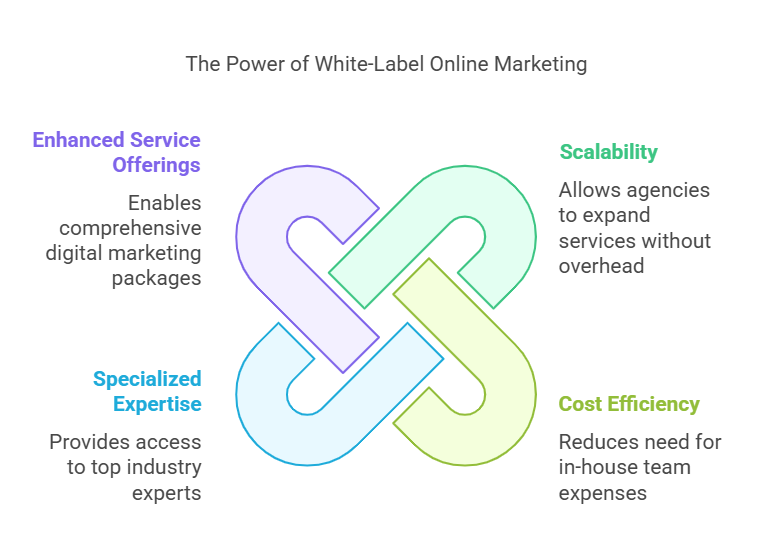
Understanding White-Label Online Marketing
White-label online marketing refers to a business model where one company provides digital marketing services that another company rebrands and sells as its own. This allows marketing agencies, consultants, and brands to offer a broader range of services without investing in additional in-house expertise or infrastructure.
Unlike traditional outsourcing, where an agency hires a third-party provider to handle specific tasks, white-label solutions are fully integrated under the agency’s branding. Clients receive high-quality services – from SEO and PPC to content marketing and social media management – without knowing that another provider is executing the work behind the scenes.
The concept of white-label services has existed for decades in industries like manufacturing and software development. However, in digital marketing, white-label solutions began gaining traction as agencies faced increasing demands for full-service offerings.
Initially, businesses outsourced only specialized tasks, such as graphic design or paid advertising. As digital marketing grew more complex – with the rise of SEO, social media, email marketing, and automation – agencies needed scalable solutions to meet client expectations. This led to the emergence of white-label online marketing, enabling agencies to deliver end-to-end marketing solutions without expanding their teams.
Advancements in technology, automation, and AI-driven analytics have further refined white-label services, making them more efficient and seamless than ever before. Today, agencies of all sizes leverage white-label partnerships to remain competitive in an industry that demands constant innovation.
For agencies looking to expand their services and remain competitive, white-label online marketing offers a powerful solution. Instead of investing in costly in-house teams or limiting service offerings, agencies can leverage white-label partnerships to scale efficiently, reduce costs, and access top-tier expertise. Below are the key benefits that make white-label solutions an essential strategy for growth.
- Scalability
White-label online marketing allows agencies to scale their service offerings without increasing operational overhead. Whether an agency serves startups or enterprise clients, it can expand its capabilities instantly by partnering with specialized white-label providers. - Cost Efficiency
Hiring in-house teams for every digital marketing discipline is expensive and time-consuming. White-label solutions eliminate the need for large payroll expenses, office space, and training, enabling agencies to maximize profitability while keeping costs low. - Access to Specialized Expertise
With white-label services, agencies gain access to industry experts in SEO, PPC, content marketing, and more – without having to recruit or train new employees. This ensures clients receive top-tier service while agencies maintain their focus on growth and client relationships. - Enhanced Service Offerings
By leveraging white-label online marketing, agencies can offer comprehensive digital marketing packages without developing services from scratch. This strengthens client retention and positions the agency as a one-stop solution for all digital marketing needs.
As businesses continue to demand full-service digital marketing strategies, white-label solutions provide agencies with the flexibility, efficiency, and expertise needed to stay ahead in an ever-changing industry.
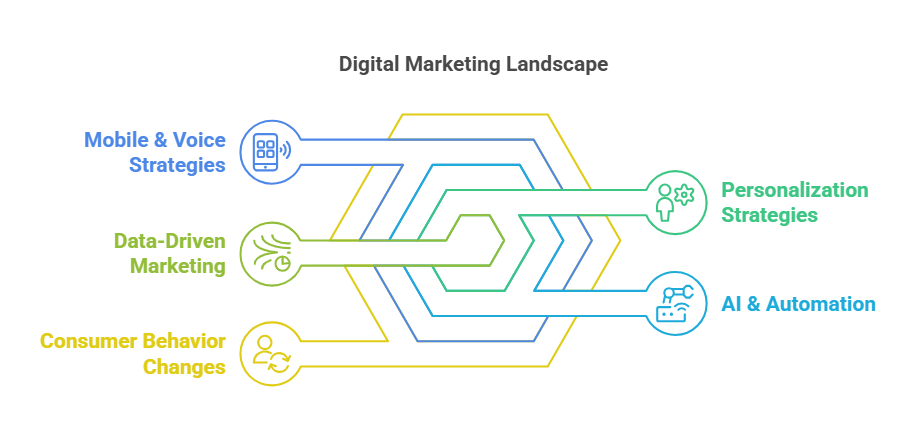
The Digital Marketing Landscape Today
The digital marketing industry is evolving at a rapid pace, driven by technological advancements and shifting consumer expectations. To stay competitive, agencies and brands must adapt to emerging trends, leverage cutting-edge tools, and refine their strategies to meet the demands of today’s digital-first world.
A. Current Industry Trends
- Data-Driven Marketing & Advanced Analytics
Marketing is no longer about intuition—it’s about insights. Businesses are increasingly relying on real-time data, predictive analytics, and AI-powered insights to understand customer behavior, optimize campaigns, and drive higher ROI. The ability to track user interactions across multiple touchpoints enables more effective decision-making and improved targeting strategies. - The Rise of Personalization & Customer-Centric Strategies
Consumers expect personalized experiences at every stage of their journey. From tailored email campaigns to AI-driven chatbots that provide instant support, brands are using personalization to enhance customer engagement. Businesses that prioritize user-centric strategies, such as dynamic content and behavior-based automation, are seeing stronger retention and conversion rates.
B. Key Technological Drivers
- Artificial Intelligence (AI) & Machine Learning (ML)
AI and ML are transforming digital marketing by automating complex processes, enhancing audience targeting, and improving content recommendations. These technologies enable predictive analysis, automated ad bidding, and AI-generated content, making campaigns more efficient and precise. - Automation & Programmatic Advertising
Automation is streamlining marketing workflows, reducing manual effort, and increasing campaign efficiency. Programmatic advertising—where AI handles real-time ad placements—allows brands to target audiences with unprecedented accuracy. Automated email marketing, chatbot interactions, and CRM integrations are also helping businesses nurture leads and optimize customer relationships. - Mobile-First Strategies & Voice Search Optimization
With the majority of internet traffic coming from mobile devices, brands must prioritize mobile-friendly content, responsive design, and fast-loading websites. Additionally, the rise of voice search has shifted SEO strategies, emphasizing conversational keywords and local search optimization to accommodate the growing use of digital assistants like Siri, Alexa, and Google Assistant.
C. Changing Consumer Behaviors
- Shifts in Buyer Expectations & Digital Engagement Patterns
Consumers today demand convenience, authenticity, and real-time interactions. They expect brands to provide seamless omnichannel experiences, whether browsing on social media, engaging with interactive ads, or communicating via chatbots. Businesses that fail to meet these expectations risk losing customer trust and engagement. - The Impact of Social Media Evolution & Influencer Marketing
Social media platforms are evolving beyond traditional engagement tools to become powerful eCommerce and customer service hubs. The rise of short-form video content, live shopping, and micro-influencers has changed how brands approach marketing. Consumers are more likely to trust recommendations from niche influencers than direct brand advertisements, making influencer collaborations a key driver of engagement and sales.
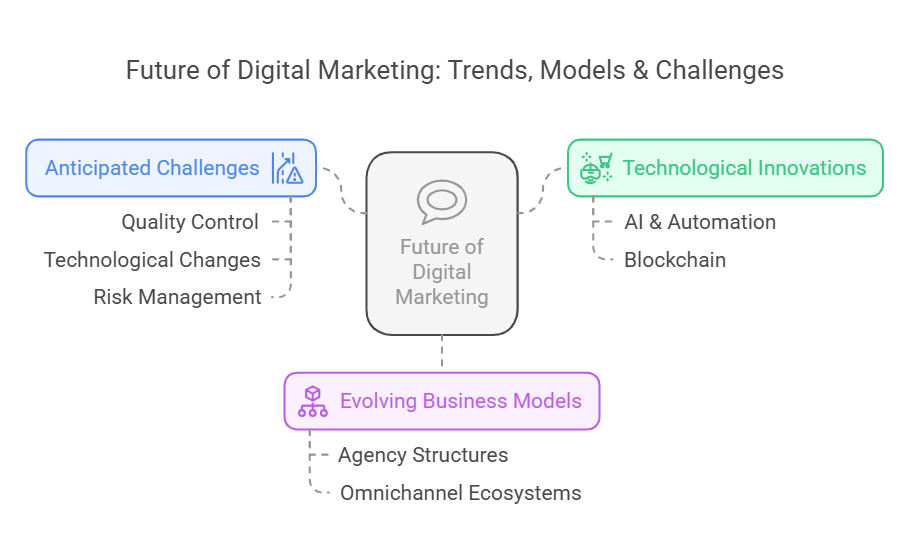
White Label Services: Shaping the Future of Digital Marketing
White-label services have become a cornerstone strategy, allowing agencies to scale, diversify, and adapt without the burden of building in-house capabilities. From expanding service offerings to leveraging advanced technology, white-label solutions are redefining the future of digital marketing.
Clients today expect comprehensive marketing solutions that go beyond a single service. White-label partnerships allow agencies to provide a full suite of offerings – such as SEO, content marketing, social media management, and paid advertising – without requiring extensive internal resources. This enhances client satisfaction and positions agencies as one-stop digital service providers.
The digital marketing landscape is dynamic, with trends shifting rapidly. White-label services enable agencies to integrate new capabilities on demand, whether it’s emerging social media platforms, AI-driven automation, or new advertising formats. Instead of spending months building expertise in-house, agencies can partner with specialized providers to offer the latest solutions instantly.
Market Opportunities and Revenue Streams
- Tapping into New Niches
The ability to expand into new industries and verticals without significant investment is one of the biggest advantages of white-label solutions. Agencies can target niche markets – such as healthcare, real estate, or eCommerce – by offering tailored marketing services without having to develop expertise from scratch. This allows for increased revenue potential and stronger market positioning. - Maximizing Profitability Through Partnerships
By leveraging white-label collaborations, agencies can operate more efficiently and profitably. Instead of hiring, training, and maintaining in-house teams, agencies can reduce overhead costs while still delivering high-quality results. Additionally, white-label providers often operate at scale, meaning agencies can access premium services at lower costs and maintain strong profit margins.
Technology and Innovation in White Label Solutions
- Emerging Technologies Transforming White Label Services
The integration of artificial intelligence, blockchain, augmented reality (AR), and virtual reality (VR) is pushing white-label services into new frontiers. AI-driven analytics, programmatic advertising, and machine learning-based automation are making digital marketing more efficient and data-driven. Meanwhile, blockchain is enhancing transparency in digital advertising, and AR/VR is reshaping the way brands engage with consumers through immersive experiences. - Real-World Applications and Success Stories
Leading agencies are already capitalizing on these advancements. Some are using AI-powered chatbots to automate customer interactions, while others are integrating blockchain technology for secure, transparent ad placements. AR and VR are being leveraged in industries like fashion and real estate, where interactive experiences drive higher engagement. Agencies that embrace these innovations through white-label solutions gain a competitive edge by staying ahead of the technology curve.
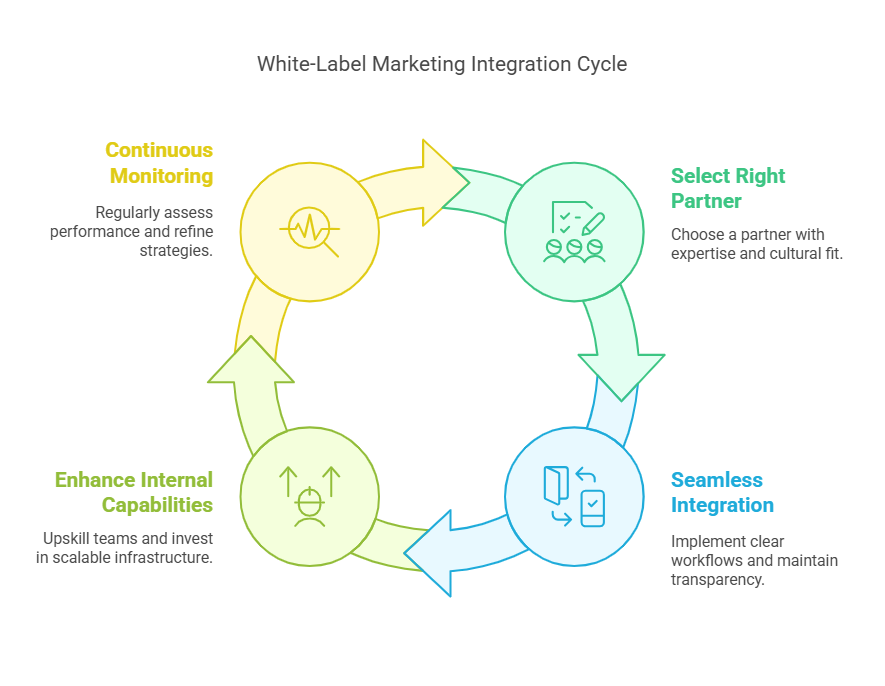
Future Predictions and Emerging Trends
The digital marketing landscape is in a constant state of transformation, driven by rapid advancements in technology, evolving business models, and shifting consumer expectations. As agencies and brands navigate this evolving ecosystem, several key trends and challenges are poised to shape the industry’s future.
Technological Innovations on the Horizon
- The Next Wave of AI, Automation, and Data Analytics
Artificial intelligence and automation are expected to become even more sophisticated, enabling hyper-personalized customer experiences, predictive marketing insights, and real-time decision-making. Advancements in natural language processing and machine learning will refine AI-driven content creation, audience segmentation, and automated customer interactions.
Data analytics will also play a more integral role, moving beyond standard reporting to provide actionable intelligence. Expect deeper integrations between analytics tools and marketing platforms, making it easier for agencies to track engagement, optimize campaigns, and predict customer behavior with greater accuracy.
- Blockchain’s Potential for Transparency and Trust
Blockchain technology is gaining attention for its ability to bring greater transparency and security to digital marketing. As concerns over ad fraud and data privacy grow, blockchain could provide a decentralized, tamper-proof way to verify ad impressions, track user engagement, and ensure ethical data practices. While adoption is still in its early stages, businesses that integrate blockchain into their digital strategies may gain a competitive edge by enhancing trust and accountability in advertising.
Evolving Business Models
- Reshaping Agency Structures and Client Relationships
The traditional agency model is shifting toward more flexible and scalable service structures. Agencies are moving away from rigid, in-house teams to dynamic, project-based partnerships that allow them to expand their capabilities without increasing operational overhead. This shift is enabling businesses to be more agile, responsive to market trends, and adaptable to changing client demands.
Client relationships are also evolving, with agencies expected to serve as strategic growth partners rather than just service providers. This means a stronger focus on performance-based marketing, where success is measured by tangible business outcomes rather than campaign execution alone.
- The Shift Toward Integrated, Omnichannel Marketing Ecosystems
As consumer touchpoints multiply across social media, search engines, video platforms, and digital marketplaces, businesses are moving toward fully integrated marketing ecosystems. Instead of siloed marketing efforts, brands are looking for cohesive strategies that provide a seamless experience across multiple channels. Agencies that can orchestrate omnichannel strategies – blending paid, earned, and owned media – will be better positioned to drive engagement and conversions.
Anticipated Challenges and Disruptors
- Maintaining Quality Control and Brand Consistency
As businesses scale their marketing efforts across multiple platforms and providers, maintaining brand consistency becomes a major challenge. Without clear guidelines and centralized oversight, messaging and visual identity can become fragmented. Agencies will need to implement robust quality assurance processes and technology-driven workflows to ensure brand integrity across all campaigns. - Managing Rapid Technological Changes
The speed at which digital marketing tools and platforms evolve presents both opportunities and challenges. Agencies must continuously upskill their teams, adopt emerging technologies, and refine their strategies to stay relevant. The ability to quickly adapt and integrate new solutions will be crucial in maintaining a competitive edge. - Mitigating Risks in a Fast-Evolving Market
With innovation comes uncertainty, and businesses must prepare for unforeseen disruptions – whether it’s regulatory changes, shifts in consumer behavior, or new competitors entering the space. Risk management strategies, such as diversifying service offerings, investing in long-term client relationships, and staying ahead of industry trends, will help agencies navigate uncertainty and sustain growth.

Best Practices for Embracing White-Label Online Marketing Trends
As the digital marketing landscape continues to evolve, agencies and brands must adopt strategic approaches to integrate white-label online marketing successfully. From selecting the right partners to ensuring seamless integration and upskilling internal teams, the right framework can help businesses scale efficiently while maintaining quality and consistency.
Selecting the Right White Label Partner
Choosing the right white-label online marketing provider is a critical step in building a scalable and successful service model. Agencies must evaluate potential partners based on several key factors:
- Expertise and Track Record – Look for providers with a proven history of delivering high-quality results in specific areas such as SEO, PPC, content marketing, and social media management. Reviewing case studies and client testimonials can help gauge their effectiveness.
- Technology Stack and Innovation – A strong partner should leverage cutting-edge tools, automation, and AI-driven solutions to enhance campaign performance and operational efficiency. Their ability to integrate with your existing platforms is essential for a seamless workflow.
- Reliability and Turnaround Times – Timely service delivery is crucial in digital marketing. Assess the provider’s ability to meet deadlines without compromising quality, ensuring your agency maintains a consistent and professional reputation.
- Cultural Fit and Communication – A white-label partnership should be a long-term, collaborative relationship. Finding a provider that aligns with your agency’s values, work ethic, and communication style will ensure a smoother integration and better results.
Seamless Integration Strategies
To maximize the benefits of white-label online marketing, agencies must implement a well-structured approach to integration. Here are key strategies to streamline the process:
- Define Clear Expectations and Workflows – Establish guidelines for project timelines, deliverables, and reporting structures to ensure smooth collaboration between your agency and the white-label provider.
- Leverage White Label Services to Complement Existing Operations – Instead of replacing in-house teams, use white-label services to fill gaps in expertise or expand into new service areas. This allows for a balanced approach that strengthens your agency’s capabilities.
- Maintain Transparency with Clients – While white-label services operate behind the scenes, agencies should still focus on transparent client communication. Setting clear performance expectations and delivering consistent reporting fosters trust and credibility.
- Use Technology for Better Collaboration – Project management tools, CRM integrations, and automated reporting systems can help ensure seamless communication between internal teams and white-label partners, improving efficiency and accountability.
Enhancing Internal Capabilities
While white-label online marketing allows agencies to expand their services without additional hiring, internal teams still need to stay informed and adaptable to get the most out of these partnerships.
- Training and Upskilling Teams – Educating employees on emerging marketing trends, analytics tools, and automation platforms ensures that in-house teams can effectively collaborate with white-label providers and optimize service delivery.
- Investing in Scalable Infrastructure – Agencies should focus on building a digital ecosystem that supports seamless white-label integration. This includes adopting cloud-based tools, marketing automation software, and data-driven decision-making processes to improve scalability and efficiency.
- Continuous Performance Monitoring – Regularly assessing the success of white-label partnerships helps agencies refine their approach. Reviewing performance metrics, gathering client feedback, and staying updated on industry trends ensure long-term success.
Overcoming Challenges and Pitfalls
While white-label online marketing offers agencies and brands an opportunity to scale and expand their service offerings, it also comes with challenges that require strategic management. From maintaining quality and consistency to managing client expectations and navigating technological disruptions, agencies must implement proactive solutions to ensure long-term success.
Maintaining Quality and Consistency
Delivering high-quality work under a white-label model requires a strong commitment to quality assurance. Since clients trust agencies to uphold their brand standards, agencies must ensure that their white-label partners meet the same level of excellence. Establishing clear quality control measures, such as standardized workflows, regular audits, and performance benchmarks, helps maintain consistency in deliverables. Transparent communication between the agency and the white-label provider is essential to avoid discrepancies in messaging, tone, and branding. By aligning branding guidelines and maintaining a review process, agencies can ensure that the final output meets client expectations while seamlessly integrating with their brand identity.
Managing Client Expectations
One of the most critical aspects of white-label online marketing is setting and managing client expectations. Since white-label services operate behind the scenes, agencies must establish clear timelines, deliverables, and communication protocols with both their clients and their service providers. Being upfront about realistic turnaround times and potential limitations helps prevent misunderstandings and ensures smoother project execution. Handling client feedback efficiently is also crucial in maintaining strong relationships. Agencies must have a structured process for gathering feedback, relaying it to their white-label partners, and implementing iterative improvements without disrupting workflow. Regular reporting and performance reviews keep clients informed and engaged, reinforcing trust in the agency’s ability to deliver high-quality results.
Navigating Technological Disruptions
The digital marketing landscape is evolving rapidly, with new technologies emerging at an unprecedented pace. Agencies leveraging white-label online marketing must stay agile and adaptable to remain competitive. Whether it’s advancements in AI, changes in search engine algorithms, or shifts in consumer behavior, agencies need to continuously update their strategies to align with industry changes. Keeping a close eye on technological trends, investing in ongoing education, and working with innovative white-label providers can help agencies stay ahead of disruptions. Additionally, having contingency plans in place – such as diversifying service offerings, maintaining strong client relationships, and leveraging flexible white-label partnerships – ensures resilience in the face of market volatility.
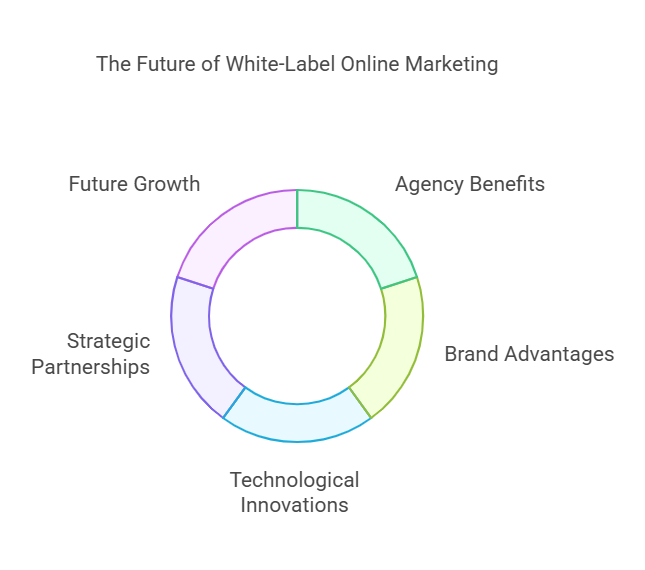
The Future of White-Label Online Marketing: Adapting, Scaling, and Thriving
White-label online marketing has emerged as a transformative force that allows agencies and brands to scale efficiently, expand service offerings, and stay competitive. By leveraging white-label solutions, agencies can provide end-to-end marketing services without the overhead of building in-house teams, while brands gain access to high-quality digital marketing strategies without the complexity of managing multiple vendors. The success stories of agencies and businesses that have embraced white-label models highlight the immense potential of this approach.
As technology continues to advance, innovation will play a crucial role in shaping the future of white-label online marketing. Artificial intelligence, automation, blockchain, and data-driven insights will redefine how agencies deliver marketing services, making efficiency, personalization, and scalability more attainable than ever. The agencies that thrive will be the ones that embrace these advancements, form strategic white-label partnerships, and continuously refine their approach to meet shifting client expectations.
Now is the time to future-proof your agency with white-label online marketing solutions. Whether you’re looking to expand your service portfolio, streamline operations, or increase revenue, partnering with a trusted provider like the White Label Agency can help you achieve sustainable growth. Explore how white-label services can elevate your agency and set you apart in a competitive market.




